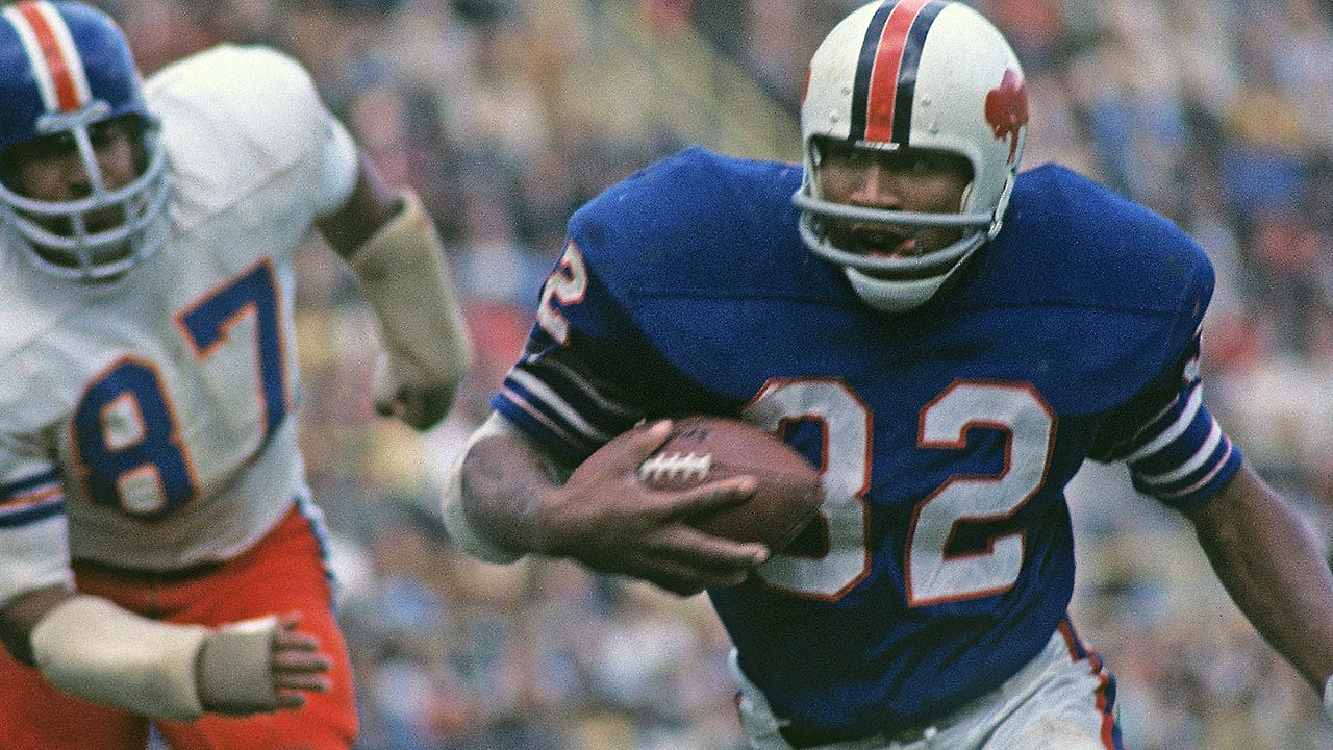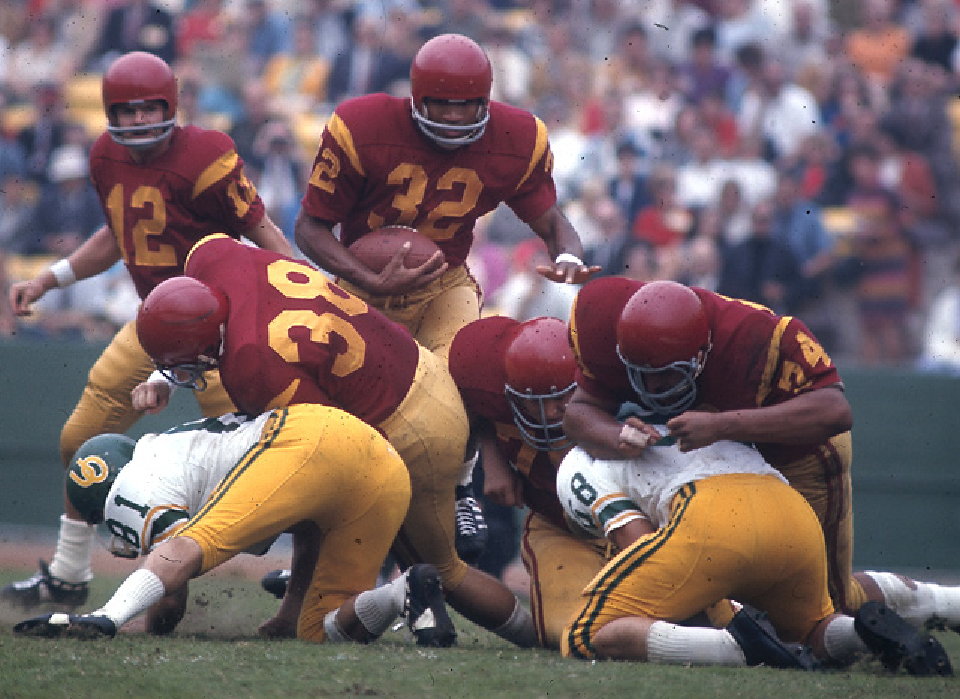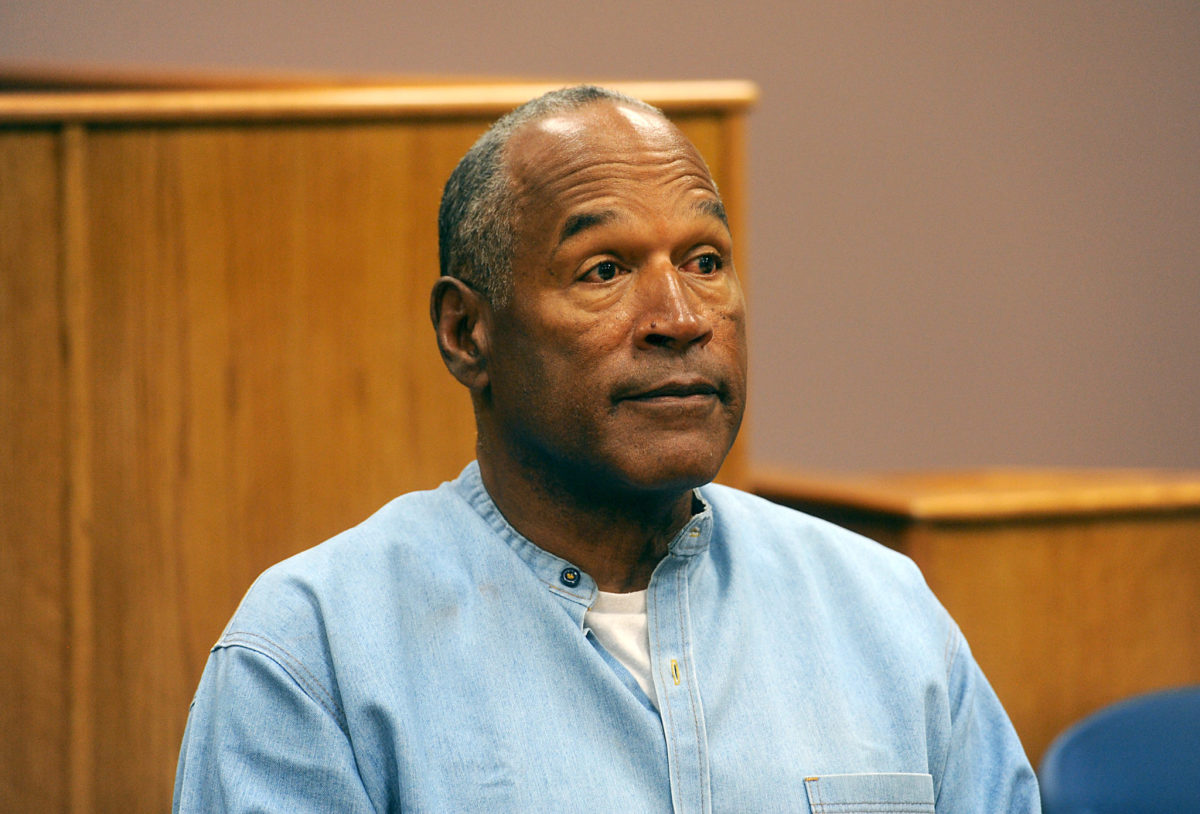Former NFL running back O.J. Simpson dies of cancer at age 76

By Grant Gordon
As remarkable on the field as he ultimately became dubious off it, O.J. Simpson transcended football.
A beloved All-American at USC who developed into one of the finest running backs in NFL history with the Buffalo Bills, Simpson would go on to achieve mainstream celebrity as an actor and broadcaster before becoming one of the most notorious murder suspects in American history and eventually serving nearly nine years in prison on an unrelated conviction for armed robbery.
Simpson died of cancer on Wednesday, according to a statement released on his official X account. He was 76 years old.
Enshrined in the Pro Football Hall of Fame in 1985, Simpson’s notoriety grew in his post-playing days as an NFL commentator and Hollywood actor. His fame would abruptly turn to infamy in June of 1994, though, after Simpson’s ex-wife, Nicole Brown Simpson, and her friend, Ronald Goldman, were found murdered at her home in Brentwood, California. Simpson was charged with the killings of Brown Simpson and Goldman, but ultimately found not guilty in one of the most highly publicized and controversial trials in United States history. Simpson’s image was forever altered, with ignominy completely overwhelming his spectacular football career and the ensuing celebrity that spawned from it.
Born Orenthal James Simpson on July 9, 1947, in San Francisco, Simpson would come to be known as O.J. or “Juice.”
He began his college football days at San Francisco City College, where he racked up 54 touchdowns and 2,552 rushing yards over two seasons in 1965 and ’66 before transferring to USC. Under legendary coach John McKay, Simpson would become one of the most decorated Trojans in the program’s storied chronicle.
As a junior in 1967, Simpson led the nation with 1,543 yards rushing, adding 13 rushing touchdowns (and three TD passes) while guiding USC to a national championship. Simpson finished runner-up in Heisman Trophy voting to UCLA quarterback Gary Beban that year, but he was the catalyst in the Trojans’ rivalry win over the Bruins. In one of the most lauded plays in USC history, Simpson broke loose for a 64-yard, game-tying, fourth-quarter TD run. The extra point vaulted the Trojans ahead, 21-20, which held as the final score.
Though USC did not repeat as national champion in ’68, Simpson’s senior campaign was one of the greatest in college football history. En route to winning the Heisman, Simpson put up staggering numbers to the tune of a then-NCAA-record 1,880 yards rushing and a nation-leading 23 touchdowns. Simpson won the Heisman by 1,750 points, a record that would stand for 51 years before LSU QB Joe Burrow‘s resounding triumph in 2019. No. 2 USC ended the season with a Rose Bowl loss to top-ranked Ohio State, but Simpson concluded his career with 171 yards rushing in the game.
After a one-win 1968 season, the Bills held the No. 1 pick in the 1969 NFL/AFL Draft and unsurprisingly chose Simpson with the first selection. Simpson did not sprint to upstate New York, however. As a bona fide star prior to entering the pros, Simpson had a standoff with then-Bills owner Ralph Wilson before he was bestowed with a five-year, $650,000 contract that was a record sum at the time. But the O.J. era in Buffalo didn’t get off to the best start.
During Simpson’s first three seasons, the Bills combined for just eight wins under head coaches John Rauch and Harvey Johnson. While Simpson was a Pro Bowler as a rookie — piling up 1,040 total yards from scrimmage while catching 30 passes (which would ultimately stand as his career high) — the accolade didn’t tell the tale of his frustrations on the field. He never came close to 1,000 yards rushing in those initial three campaigns.
With the addition of head coach Lou Saban in 1972, though, Simpson’s career switched into high gear. He returned to the Pro Bowl and won the first rushing title with a 1,251-yard showing. Then in 1973, Simpson sprinted to one of the greatest seasons for a running back in NFL history.
In the 14-game campaign, Simpson ran for 2,003 yards, shattering Jim Brown’s single-season rushing record of 1,863 yards set in 1963. Simpson sat alone in the 2,000-yard club until Eric Dickerson joined him in 1984 — though Simpson, who averaged an astounding 143.1 ground yards per game, remains the only player to have accomplished the feat in fewer than 16 games. Simpson, who also led the league with 332 carries and 12 rushing TDs, was named league MVP. Simpson’s yards-per-game tally is still the highest single-season mark in league history by a full 10 yards, and he remains one of just eight players to have ever hit the 2,000-yard milestone mark.
Buffalo went 9-5 in the 1973 season. It was the first time in Simpson’s career the Bills finished above .500, but they still fell short of the playoffs. Simpson was the star of the show, though his prolific play gave rise to “The Electric Company.” That nickname was at times attributed to the offense as a whole, but it primarily referred to the offensive line that blocked for Simpson, inherently “turning on the Juice.” Led by Hall of Fame right guard Joe DeLamielleure, the group also included left tackle Dave Foley, left guard Reggie McKenzie, center Mike Montler and right tackle Donnie Green.
Simpson won all four of his career rushing titles from 1972 through ’76. The only season he fell short of the crown was 1974, which, as fate would have it, would end up being the only playoff campaign of his career. Simpson finished that ’74 season with 1,125 yards and just three rushing scores, but the Bills were aided mightily by a Tony Greene-led defense. This time around, a 9-5 record was good enough for a postseason berth, but the Bills were easily dispatched by the Pittsburgh Steelers, 32-14, in the AFC Divisional Round. Simpson caught a short TD catch from Joe Ferguson when the game was all but over and was confined to just 49 yards on 15 carries.
That prolific five-season span in the mid-1970s was truly the defining stretch of his pro career. In his other six seasons, he never hit 1,000 yards or eclipsed five touchdowns. After winning the 1976 rushing crown with 1,503 yards, Simpson was limited to seven games in the 1977 campaign due to injury. In the ensuing offseason, Simpson was shipped back home, traded to the San Francisco 49ers for a cache of draft picks. Simpson’s final two seasons fell flat, as he played in 23 of a possible 32 games, rushing for a combined 1,053 yards during a pair of 2-14 seasons for the Niners. He averaged 3.7 yards per carry in 1978 and 3.8 in ’79, becoming a shell of the gamebreaker he once was.
Still, when Simpson hung it up, he ranked second in league history with 11,236 career rushing yards, trailing only Brown (12,312). He made six Pro Bowls in 11 seasons (nine with the Bills, two with the 49ers), receiving five first-team All-Pro nods. He earned spots on the Hall of Fame All-Decade Team of the 1970s and the NFL 100th Anniversary All-Time Team.
Simpson’s post-playing career had already gotten underway long before his final season. He was a professional actor prior to becoming a professional football player, and more than 15 of his nearly 40 acting credits came prior to his final season of 1979. Among Simpson’s most notable roles: playing “Nordberg” in the Naked Gun movies.
Perhaps his greatest fame on the small screen came in 1975, when he became a spokesman for the rental car company Hertz, filming an iconic commercial in which Simpson sprinted through an airport, hurdling obstacles as an onlooker yelled, “Go, O.J., go!” It was also in 1975 when People magazine declared Simpson “the first [B]lack athlete to become a bona fide lovable media superstar.”
Though retired from the playing field, Simpson remained a star in the NFL world as an analyst and more so an on-field interviewer. From 1983 through ’85, Simpson was a color commentator on Monday Night Football. He was a staple of The NFL on NBC for years, as well, and also a commentator for ABC’s Wide World of Sports.
But Simpson pleaded no contest to a domestic violence charge against his wife in 1989. Then in the summer of 1994, Brown Simpson and Goldman were found stabbed to death, and O.J. quickly became a person of interest in the murders.
Charges were filed and a warrant was issued for the arrest of Simpson. On the morning of June 17, Simpson was scheduled to turn himself in, but he instead led police officers on a low-speed pursuit, with friend and former high school/college/NFL teammate Al Cowlings driving a white Ford Bronco that eventually ended up at O.J.’s home. Along the way, the chase became a national event, playing across every major TV network, including NBC, which interrupted the 1994 NBA Finals to broadcast the live news. The drive lasted more than two hours, with crowds of Angelenos gathering on freeway overpasses and streets to witness the surreal scene in person. Nearly an hour after arriving at his home, Simpson surrendered to police.
The subsequent murder trial was an unprecedented media storm. Simpson’s defense — dubbed the “Dream Team” — was a counsel of well-known attorneys, including Robert Shapiro, Johnnie Cochran, Robert Kardashian, F. Lee Bailey and Alan Dershowitz. The trial played out over 11 months, and on Oct. 3, 1995, when the final verdict was set to be announced, it altered school schedules as the nation essentially paused to tune in. Simpson was found not guilty for the two murders. In the aftermath of Simpson’s acquittal, no additional arrests were ever made in the murders of Brown Simpson and Goldman.
A year later, Simpson faced a civil lawsuit for wrongful death. This time around, video and still cameras were barred from the courtroom. The trial began on Oct. 23, 1996, and ended on Feb. 5, 1997, with the jury unanimously finding Simpson liable for wrongful death. Simpson was ordered to pay $33.5 million in damages to the victims’ families.
A decade later, Simpson was arrested again following an incident in Las Vegas. On Sept. 13, 2007, Simpson and a group of men entered a Palace Station hotel room and took a cache of sports memorabilia at gunpoint, with O.J. claiming the items had been stolen from him. On Oct. 3, 2008 — exactly 13 years after Simpson was acquitted in the double-murder case — a jury found Simpson guilty of 12 charges, including armed robbery and kidnapping. On Dec. 5, 2008, Simpson was sentenced to 33 years in prison with eligibility for parole after nine years. On July 20, 2017, Simpson was granted parole.
An underdog who rose from poverty to become an all-world athlete and cultural megastar, Simpson’s stunning fall from grace played out on a national scale, which was morbidly fitting. Through each chapter of his adult life — good, bad and heinous — O.J. was in the spotlight.
“As a kid growing up in the ghetto, one of the things I wanted most was not money — it was fame,” Simpson said, per O.J.: Made in America, an ESPN documentary that garnered widespread attention in 2016, along with an FX miniseries from that same year, The People v. O.J. Simpson: American Crime Story. “I wanted to be known. I wanted people to say, ‘There goes O.J.’


